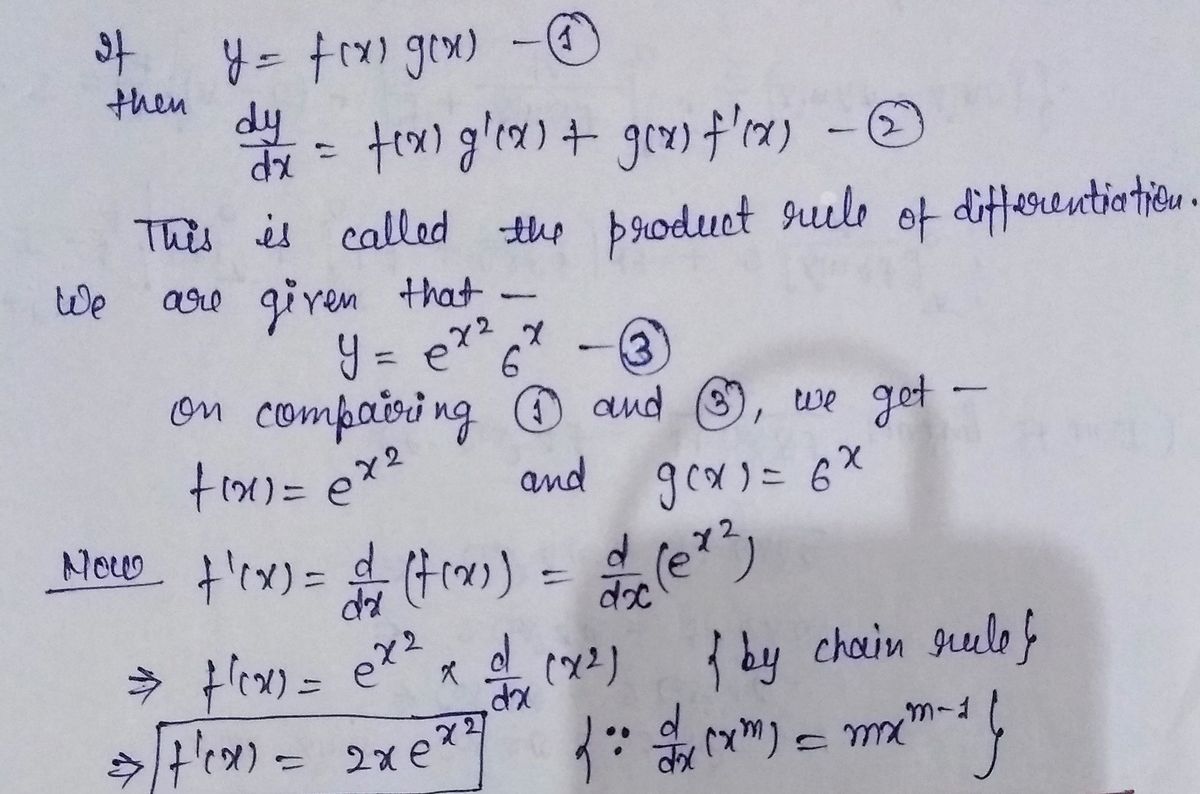Find if y = e*² · 6* %3D dx
Advanced Engineering Mathematics
10th Edition
ISBN:9780470458365
Author:Erwin Kreyszig
Publisher:Erwin Kreyszig
Chapter2: Second-order Linear Odes
Section: Chapter Questions
Problem 1RQ
Related questions
Question
![**Problem:**
Find \(\frac{dy}{dx}\) if \(y = e^{x^2} \cdot 6^x\).
**Solution:**
To find the derivative of the function \(y = e^{x^2} \cdot 6^x\), we will use the product rule and chain rule.
1. **Expression:** \(y = f(x) \cdot g(x)\), where \(f(x) = e^{x^2}\) and \(g(x) = 6^x\).
2. **Product Rule:** \(\frac{d}{dx}[f(x)\cdot g(x)] = f'(x) \cdot g(x) + f(x) \cdot g'(x)\).
3. **Derivative of \(f(x) = e^{x^2}\):**
- Use the chain rule: \(\frac{d}{dx}[e^{x^2}] = e^{x^2} \cdot \frac{d}{dx}[x^2] = e^{x^2} \cdot 2x\).
4. **Derivative of \(g(x) = 6^x\):**
- Use the exponential rule: \(\frac{d}{dx}[6^x] = 6^x \cdot \ln(6)\).
5. **Apply the Product Rule:**
- \(\frac{dy}{dx} = e^{x^2} \cdot 2x \cdot 6^x + e^{x^2} \cdot 6^x \cdot \ln(6)\).
6. **Simplify:**
- \(\frac{dy}{dx} = e^{x^2} \cdot 6^x \cdot (2x + \ln(6))\).
Final expression for the derivative is:
\(\frac{dy}{dx} = e^{x^2} \cdot 6^x \cdot (2x + \ln(6))\).](/v2/_next/image?url=https%3A%2F%2Fcontent.bartleby.com%2Fqna-images%2Fquestion%2F22078c38-dc03-412f-8ada-10e24c80c6d1%2Fedbed672-3a4a-4d46-a117-cbcd52a19f38%2Fkcv0w8_processed.png&w=3840&q=75)
Transcribed Image Text:**Problem:**
Find \(\frac{dy}{dx}\) if \(y = e^{x^2} \cdot 6^x\).
**Solution:**
To find the derivative of the function \(y = e^{x^2} \cdot 6^x\), we will use the product rule and chain rule.
1. **Expression:** \(y = f(x) \cdot g(x)\), where \(f(x) = e^{x^2}\) and \(g(x) = 6^x\).
2. **Product Rule:** \(\frac{d}{dx}[f(x)\cdot g(x)] = f'(x) \cdot g(x) + f(x) \cdot g'(x)\).
3. **Derivative of \(f(x) = e^{x^2}\):**
- Use the chain rule: \(\frac{d}{dx}[e^{x^2}] = e^{x^2} \cdot \frac{d}{dx}[x^2] = e^{x^2} \cdot 2x\).
4. **Derivative of \(g(x) = 6^x\):**
- Use the exponential rule: \(\frac{d}{dx}[6^x] = 6^x \cdot \ln(6)\).
5. **Apply the Product Rule:**
- \(\frac{dy}{dx} = e^{x^2} \cdot 2x \cdot 6^x + e^{x^2} \cdot 6^x \cdot \ln(6)\).
6. **Simplify:**
- \(\frac{dy}{dx} = e^{x^2} \cdot 6^x \cdot (2x + \ln(6))\).
Final expression for the derivative is:
\(\frac{dy}{dx} = e^{x^2} \cdot 6^x \cdot (2x + \ln(6))\).
Expert Solution
Step 1

Step by step
Solved in 2 steps with 2 images

Knowledge Booster
Learn more about
Need a deep-dive on the concept behind this application? Look no further. Learn more about this topic, advanced-math and related others by exploring similar questions and additional content below.Recommended textbooks for you

Advanced Engineering Mathematics
Advanced Math
ISBN:
9780470458365
Author:
Erwin Kreyszig
Publisher:
Wiley, John & Sons, Incorporated

Numerical Methods for Engineers
Advanced Math
ISBN:
9780073397924
Author:
Steven C. Chapra Dr., Raymond P. Canale
Publisher:
McGraw-Hill Education

Introductory Mathematics for Engineering Applicat…
Advanced Math
ISBN:
9781118141809
Author:
Nathan Klingbeil
Publisher:
WILEY

Advanced Engineering Mathematics
Advanced Math
ISBN:
9780470458365
Author:
Erwin Kreyszig
Publisher:
Wiley, John & Sons, Incorporated

Numerical Methods for Engineers
Advanced Math
ISBN:
9780073397924
Author:
Steven C. Chapra Dr., Raymond P. Canale
Publisher:
McGraw-Hill Education

Introductory Mathematics for Engineering Applicat…
Advanced Math
ISBN:
9781118141809
Author:
Nathan Klingbeil
Publisher:
WILEY

Mathematics For Machine Technology
Advanced Math
ISBN:
9781337798310
Author:
Peterson, John.
Publisher:
Cengage Learning,

